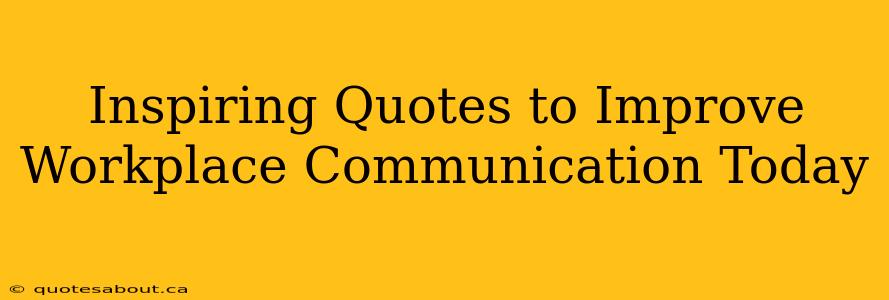Effective workplace communication is the bedrock of a thriving, productive team. Misunderstandings, missed deadlines, and low morale often stem from poor communication. Luckily, a few insightful quotes can serve as powerful reminders and catalysts for positive change. This article explores inspiring quotes about communication, examining their relevance to modern workplaces and offering practical strategies for implementation. We'll also address some frequently asked questions about improving workplace communication.
The Power of Words: Inspiring Quotes on Workplace Communication
Before diving into specific quotes, it's important to acknowledge the profound impact words have. They shape perceptions, influence actions, and build (or break) relationships. In a professional setting, clear, concise, and empathetic communication is paramount. Let's explore some impactful quotes that highlight this truth:
"The single biggest problem in communication is the illusion that it has taken place." – George Bernard Shaw
This quote highlights a crucial point: simply saying something doesn't mean it's been understood. Effective communication requires confirmation of understanding, active listening, and a willingness to clarify any ambiguities. One-way communication rarely works in a dynamic workplace environment.
"Listening is a magnetic and creative force." – Frank Tyger
Active listening isn't merely hearing words; it's about understanding the speaker's perspective, empathizing with their feelings, and responding thoughtfully. This quote emphasizes the crucial role of listening in fostering strong communication.
"The greatest problem with communication is the assumption that it has occurred." – Bernard Baruch
Similar to Shaw's quote, Baruch underscores the importance of verifying comprehension. Feedback, both verbal and nonverbal, is critical in ensuring a shared understanding. Are team members understanding your instructions? Are your expectations clearly communicated? Regular check-ins and open dialogue are essential.
How to Apply These Quotes to Your Workplace
These quotes aren't just inspirational; they're actionable. Here are some practical ways to incorporate their wisdom into your daily work life:
-
Encourage Active Listening: Implement strategies to promote active listening during meetings and one-on-one conversations. Train team members to paraphrase, ask clarifying questions, and provide feedback.
-
Seek Feedback Regularly: Regularly solicit feedback from colleagues on the clarity of your communication. This helps identify areas for improvement and ensures everyone is on the same page.
-
Embrace Transparency: Open and honest communication fosters trust. Encourage a culture where employees feel comfortable sharing their ideas, concerns, and feedback without fear of retribution.
-
Utilize Multiple Communication Channels: Recognize that different communication styles resonate with different individuals. Leverage various platforms like email, instant messaging, and in-person meetings to reach your audience effectively.
Frequently Asked Questions (FAQs)
What are the most common communication barriers in the workplace?
Common barriers include poor listening skills, lack of clarity in messaging, cultural differences, technological limitations, emotional barriers (fear, anger, stress), and information overload. Addressing these barriers requires a multifaceted approach that includes training, establishing clear communication protocols, and fostering a supportive and inclusive work environment.
How can I improve my written communication skills in the workplace?
Improving written communication requires attention to clarity, conciseness, grammar, and style. Using active voice, bullet points, and clear headings can improve readability. Proofreading carefully and seeking feedback from colleagues can help ensure effective communication.
How can I handle conflict effectively through communication?
Conflict is inevitable. Effective communication during conflict involves active listening, empathy, clear articulation of concerns, and a willingness to find mutually agreeable solutions. Mediation can be helpful in resolving complex disputes. Focusing on the issue, not the person, is critical for constructive conflict resolution.
What are some tools or technologies to improve workplace communication?
Numerous tools enhance communication. Project management software (Asana, Trello), instant messaging platforms (Slack, Microsoft Teams), video conferencing tools (Zoom, Google Meet), and internal communication platforms all play a vital role in streamlining information sharing and collaboration. Choosing the right tools depends on your specific needs and organizational structure.
By embracing the wisdom within these quotes and implementing practical strategies, you can significantly enhance workplace communication, leading to a more collaborative, productive, and positive work environment. Remember, effective communication isn't just about conveying information; it's about fostering understanding, building relationships, and achieving shared goals.

